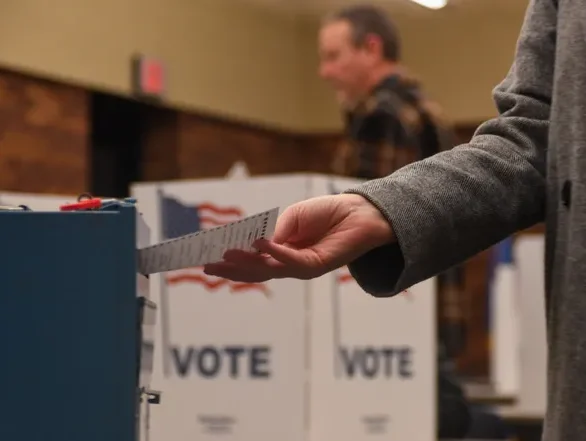
South Dakota Voters Reject Law Allowing Pipeline Companies To Override Local Restrictions
Referred Law 21, a law meant to ease the path of carbon dioxide pipeline construction, was killed by South Dakota voters.
RL 21 is a ballot measure encompassing Senate Bill 201, a law that was passed by the legislature in March but later challenged through a voter referendum by a grassroots group of South Dakota landowners. The bill would have instituted a relatively large number of changes to laws affecting “linear transmission facilities,” or pipelines, particularly those meant to carry carbon dioxide.
By 7:30 a.m. Wednesday, with nearly 90% of precincts finished counting ballots — and Minnehaha County’s results only partially tallied — the vote on the referred law came down to 60% of South Dakotans saying to repeal it and 40% opting to keep it.
The law, SB 201, was complex with two important changes for South Dakota.
First, Summit Carbon Solutions, a company planning to build the largest carbon sequestration pipeline network in the U.S., and other developers would have been able to supersede all local and county rules, regulations and ordinances that would restrict where they can build a permitted pipeline.
The company’s Midwest Carbon Express pipeline is estimated to cost $8 billion, and it would run about 2,500 miles, several hundred miles of which would run through eastern South Dakota.
Secondly, SB 201 would have codified a “Landowner Bill of Rights,” a series of protective provisions for South Dakota landowners whose properties are affected by pipeline development.
Some other provisions in SB 201 included:
- Creating new requirements for regulating “linear transmission facilities,” or pipelines;
- Allowing counties to impose an annual surcharge on pipelines at $1 per linear foot;
- Directing at least 50% of collected surcharge revenue to be distributed as tax relief to landowners impacted by a pipeline, with the rest being spent at the county’s discretion;
- And requiring pipeline companies to release their dispersion models — a simulated depiction of the release of hazardous carbon dioxide meant to demonstrate what would happen if a pipeline ruptures — to the South Dakota Public Utilities Commission, a state regulatory body.
Sen. Casey Crabtree (R-Madison), who drafted SB 201 along with Rep. Will Mortenson (R-Fort Pierre), said he appreciated the effort put forward by his colleagues in “trying to find a compromise that protects landowners, holds operates responsible and provides needed relief and new opportunities for our state’s ag industry and rural communities.”
“I respect the opinion of the South Dakota voters and look forward to returning to Pierre in January to ensure South Dakota remains the best place in the word to live, work and raise a family,” Crabtree wrote in a Wednesday statement.
Despite the vote coming down unfavorably for carbon capture proponents, Summit Carbon indicated in a Wednesday statement the company still intends to apply for a permit with the PUC in order to build its pipeline in South Dakota. They even provided a date for their permit application: Nov. 19, 2024.
“Our focus continues to be on working with landowners and ensuring the long-term viability of ethanol and agriculture in the state,” the company wrote in the statement. “Projects like ours have successfully navigated South Dakota’s existing regulatory landscape in the past. We will continue to operate within the current framework, knowing that the future of ethanol and agriculture is vital to our shared success.”
Summit Carbon’s pipeline network is meant to capture liquified carbon dioxide, a greenhouse gas, from Corn Belt ethanol plants. The waste byproduct would then be transported to a site in North Dakota for underground burial. Ethanol plants connected to the pipeline would be able to qualify for certain federal tax credits for lowering their fuel’s carbon intensity scores.
Some of the company’s ethanol industry partners served as surrogates for the “yes” campaign on RL 21, collectively donating $2.57 million to Vote Yes for a Strong South Dakota, a proponent of the law. Of that $2.57 million, Sioux Falls-headquartered POET, the world’s largest bioethanol producer, made up $1 million in contributions, while $800,000 came from Glacial Lakes Energy, a Watertown ethanol company.
Dakota Rural Action, a group opposed to the referred law, celebrated the results early Wednesday and called it “a significant win for those committed to solving the actual issues these CO2 pipelines have raised in our state.”
“South Dakota voters have spoken: South Dakota is not for sale,” wrote Ed Fischbach, a Spink County landowner, in a Dakota Rural Action press release. “Summit and its big-moneyed partners thought they could buy the voters as easily as they bought the legislature. They outspent us by over a tenfold, but voters saw through their lies.”
